Jake Buehler
Jake Buehler is a freelance science writer, covering natural history, wildlife conservation and Earth's splendid biodiversity, from salamanders to sequoias. He has a master's degree in zoology from the University of Hawaii at Manoa.

Trustworthy journalism comes at a price.
Scientists and journalists share a core belief in questioning, observing and verifying to reach the truth. Science News reports on crucial research and discovery across science disciplines. We need your financial support to make it happen – every contribution makes a difference.
All Stories by Jake Buehler
-
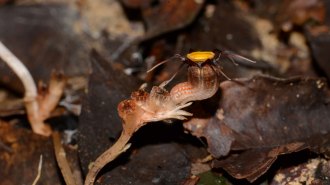 Plants
PlantsThis tentacled, parasitic ‘fairy lantern’ plant is new to science
The bizarre new plant from Malaysia parasitizes subterranean fungi and only briefly erupts from the soil to flower.
-
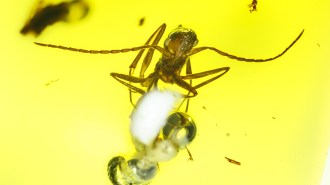 Paleontology
PaleontologyEarly ants may have had complex social lives, fossil data suggests
The earliest ants may have been primed for a highly social life — 100 million years ago, the insects had antennae tuned to key communication functions.
-
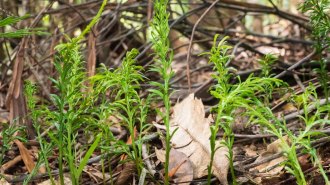 Life
LifeThe largest known genome belongs to a tiny fern
Though 'Tmesipteris oblanceolata' is just 15 centimeters long, its genome dwarfs humans’ by more than 50 times.
-
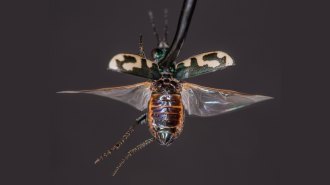 Animals
AnimalsTiger beetles may weaponize ultrasound against bats
In response to recordings of echolocating bats, tiger beetles emit noises that mimic toxic moths that bats avoid.
-
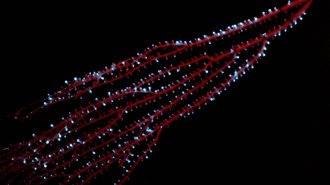 Animals
AnimalsGlowing octocorals have been around for at least 540 million years
Genetic and fossil analyses shine a light on how long the invertebrates have had bioluminescence — a trait thought to be volatile.
-
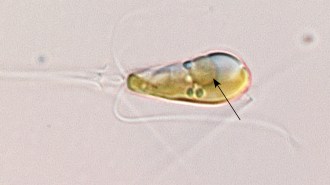 Life
LifeThis marine alga is the first known eukaryote to pull nitrogen from air
An alga’s bacterial symbiote has evolved into an organelle that turns atmospheric nitrogen into ammonia, making the alga unique among eukaryotes.
-
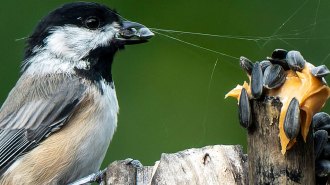 Neuroscience
NeuroscienceChickadees use memory ‘bar codes’ to find their hidden food stashes
Unique subsets of neurons in a chickadee’s memory center light up for each distinct cache, hinting at how episodic memories are encoded in the brain.
-
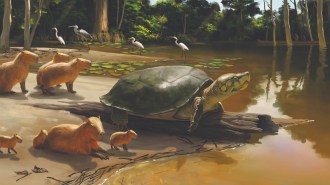 Paleontology
PaleontologyAn extinct sofa-sized turtle may have lived alongside humans
Peltocephalus maturin was one of the biggest turtles ever, but unlike similarly sized prehistoric freshwater turtles, it lived thousands of years ago.
-
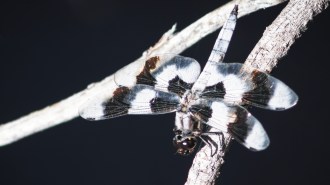 Animals
AnimalsMale dragonflies’ wax coats might protect them against a warming climate
The reflective wax, which cools males on sunny courtship flights, may also armor them against the effects of climate change.
-
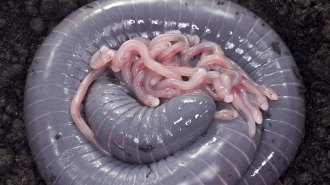 Life
LifeThis is the first egg-laying amphibian found to feed its babies ‘milk’
Similar to mammals, these ringed caecilians make a nutrient-rich milk-like fluid to feed their mewling hatchlings up to six times a day.
-
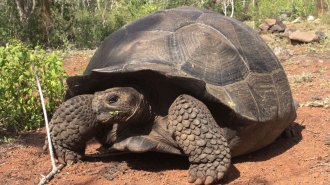 Animals
AnimalsGiant tortoise migration in the Galápagos may be stymied by invasive trees
An invasion of Spanish cedar trees on Santa Cruz Island may block the seasonal migration routes of the island's giant tortoise population.
-
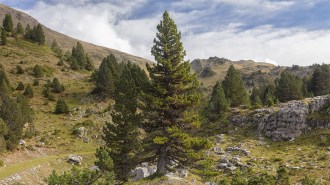 Plants
PlantsAncient trees’ gnarled, twisted shapes provide irreplaceable habitats
Traits that help trees live for hundreds of years also foster forest life, one reason why old growth forest conservation is crucial.